Understanding the Google Pigeon Update for Local SEO Success
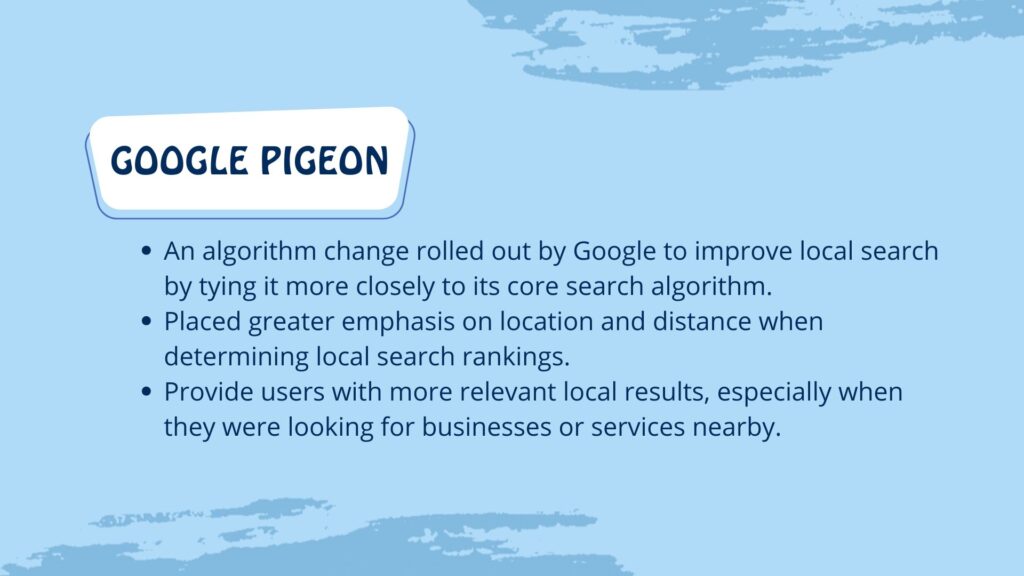
If you’re a local business owner or someone focused on improving local search engine rankings, the Google Pigeon Update is a crucial part of local SEO that you need to understand. Launched in July 2014, the Pigeon Update was designed to improve local search results by making them more accurate and relevant to users.
In this blog post, we’ll explain what the Google Pigeon Update is, how it impacts local search results, and how you can use it to your advantage for local SEO success.
In this article:
- What is the Google Pigeon Update?
- How the Google Pigeon Update Changed Local Search
- How the Google Pigeon Update Impacts Local SEO
- How to Stay Ahead After the Pigeon Update
What is the Google Pigeon Update?
The Google Pigeon Update was an algorithm change rolled out by Google to refine how local search results are handled. Before the Pigeon Update, local search results were often inconsistent and not fully integrated with traditional organic search results. Google introduced Pigeon to improve local search by tying it more closely to its core search algorithm.
This update placed greater emphasis on location and distance when determining local search rankings. The goal was to provide users with more relevant local results, especially when they were looking for businesses or services nearby.
For example, if you search for “pizza near me,” the Pigeon Update ensures that the results you see are more closely related to your current location, showing you local pizza restaurants within a reasonable distance.
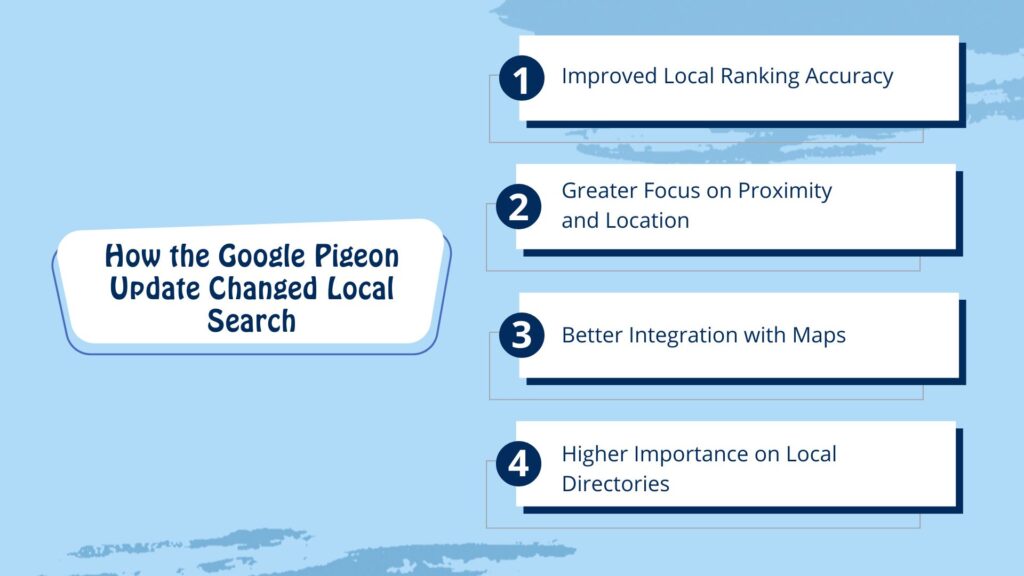
How the Google Pigeon Update Changed Local Search
The Pigeon Update had several effects on local SEO, changing how businesses appear in local search results and how search engines interpret user queries with local intent.
1. Improved Local Ranking Accuracy
Before the Pigeon Update, Google’s local search results often felt disconnected from regular organic results. The update integrated local search more closely with organic results, which means that traditional SEO factors (such as backlinks, domain authority, and keyword relevance) now play a more significant role in determining how businesses rank in local searches.
2. Greater Focus on Proximity and Location
One of the key features of the Pigeon Update is its focus on proximity. Google now prioritizes the physical location of a business in relation to the user conducting the search. This is why “near me” searches have become more accurate — Google’s algorithm takes into account the user’s location and the proximity of nearby businesses to deliver more relevant results.
For businesses, this means it’s essential to accurately list your location information, including your address and business hours, on Google My Business and other local directories to ensure you’re showing up in searches for your local area.
3. Better Integration with Maps
The Pigeon Update also improved the integration between local search results and Google Maps. Businesses that show up in Google Maps are more likely to appear in local search results as well. This update made Google Maps an essential part of any local SEO strategy, as appearing on Maps helps users find your business more easily.
4. Higher Importance on Local Directories
Local business directories or vertical search engines, such as Yelp, TripAdvisor, and Yellow Pages, saw a boost in their search rankings after the Pigeon Update. Since these directories are viewed as trustworthy sources of information, businesses listed on them often see improvements in their local rankings.
This means that getting your business listed on relevant directories with accurate Name, Address, and Phone number (NAP) information is more important than ever for local SEO success.
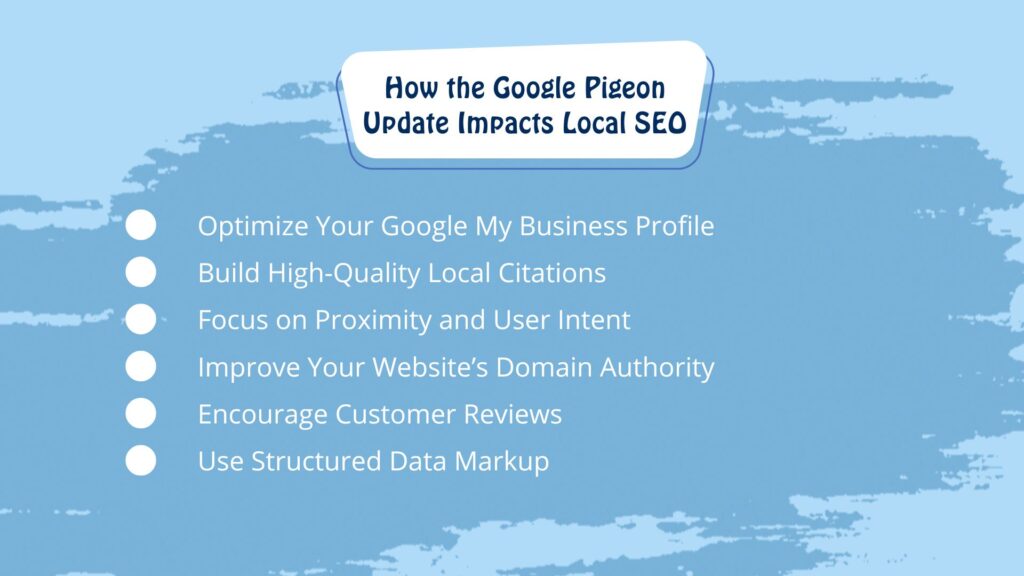
How the Google Pigeon Update Impacts Local SEO
The changes brought about by the Pigeon Update have had a lasting effect on local SEO. If you’re a business owner or SEO professional trying to improve local rankings, here are some key areas you should focus on to take full advantage of this update.
1. Optimize Your Google My Business Profile
Your Google My Business (GMB) profile is one of the most important tools for local SEO. Since the Pigeon Update, having an optimized GMB profile has become even more crucial for ranking well in local searches.
Steps to Optimize Your GMB Profile:
- Ensure your Name, Address, and Phone number (NAP) are accurate and consistent across all platforms.
- Add a detailed business description that includes relevant keywords related to your business.
- Regularly update your business hours, including special hours for holidays.
- Encourage customers to leave reviews on your GMB profile, as positive reviews improve your local rankings.
Avoid using auto-generated content on your business listings, as it can affect credibility and user trust.
2. Build High-Quality Local Citations
Since the Pigeon Update, local citations (mentions of your business’s name, address, and phone number on other websites) have become more valuable for local SEO. Building citations in local directories such as Yelp, Yellow Pages, and industry-specific directories can help search engines verify your business’s legitimacy and location.
Tips for Building Local Citations:
- Make sure your NAP information is consistent across all citations.
- Submit your business to reputable local and industry-specific directories.
- Regularly audit your citations to ensure accuracy and update them as needed.
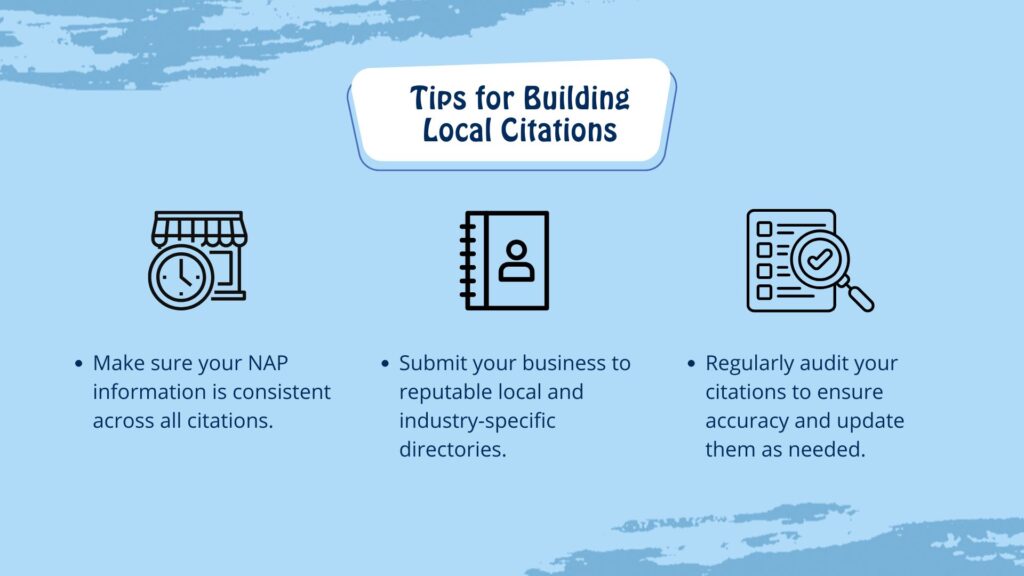
3. Focus on Proximity and User Intent
The Pigeon Update emphasizes proximity and user intent more than ever before. Businesses that are physically closer to users performing a search are more likely to appear in the top results, especially for queries that include “near me.”
To take advantage of this, it’s important to focus on local keywords and make sure your website is optimized for searches that indicate local intent, such as “restaurant near me” or “plumber in [city].”
4. Improve Your Website’s Domain Authority
With the Pigeon Update, local search results are now more closely tied to traditional SEO factors, such as domain authority and backlink quality. This means that having a well-optimized website with high-quality backlinks can improve your local rankings.
Strategies to Boost Domain Authority:
- Earn backlinks from reputable local websites and blogs.
- Create high-quality content that attracts links from other sites.
- Optimize your website for mobile devices to ensure a good user experience.
5. Encourage Customer Reviews
Online reviews have become an even more important ranking factor after the Pigeon Update. Positive reviews on platforms like Google My Business and Yelp can significantly improve your local search rankings and build trust with potential customers. Consider seasonal trends when updating business information, like special holiday hours or seasonal offers.
Encouraging customers to leave reviews is a key part of local SEO success, which also increases author authority. Make it easy for customers to leave reviews by providing direct links or follow-up emails asking for feedback.
6. Use Structured Data Markup
Structured data markup (also known as schema markup) helps search engines better understand the information on your website. By adding structured data to your site, you can provide search engines with clear information about your business, such as your location, services, and contact details.
Using structured data can help improve your chances of appearing in rich snippets, local packs, and other SERP features that highlight local businesses.
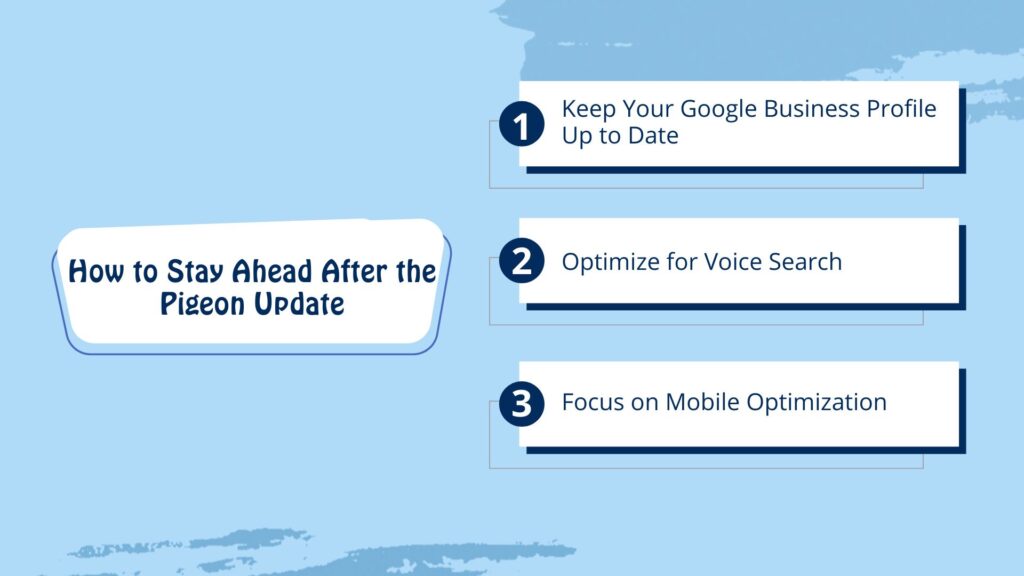
How to Stay Ahead After the Pigeon Update
While the Pigeon Update has made local search more accurate and user-focused, it’s also made competition for top rankings even fiercer. Here are some additional tips to help you stay ahead in local SEO:
- Keep Your Google Business Profile Up to Date: Regularly update your Google Business Profile with new information, such as promotions, new services, or changes to your business hours. Checking and updating your citations helps avoid issues like a 409 conflict, where duplicate data might confuse search engines.
- Optimize for Voice Search: With the rise of voice search, many users now search for local businesses using voice-activated assistants like Siri or Google Assistant. Make sure your website is optimized for voice queries by using natural language and long-tail keywords.
- Focus on Mobile Optimization: Many local searches are conducted on mobile devices, so it’s important that your website is mobile-friendly. Ensure your site loads quickly and provides a seamless experience on smartphones and tablets. Including a footer link with your business’s address can also support local SEO efforts.
Conclusion
The Google Pigeon Update brought major improvements to local search results, making them more accurate and relevant to users. For businesses, this update highlights the importance of local SEO strategies, such as optimizing your Google My Business profile, building local citations, and focusing on proximity and user intent. These tactics will improve your online visibility and help your business attract more local customers.
To make the most of the Google Pigeon Update, you need to focus on boosting local visibility and authority through high-quality backlinks. With Link Genius, you can easily connect with reputable sites that boost your SEO efforts, making it easier for potential customers to find you online.
Start building local authority today with Link Genius and see the difference in your search rankings!
